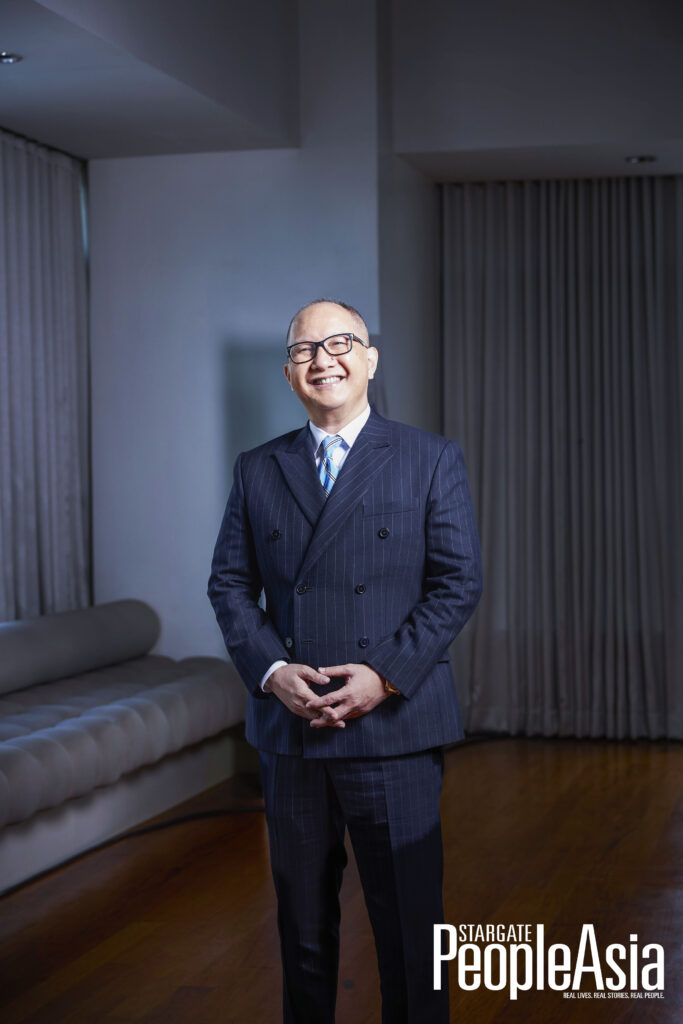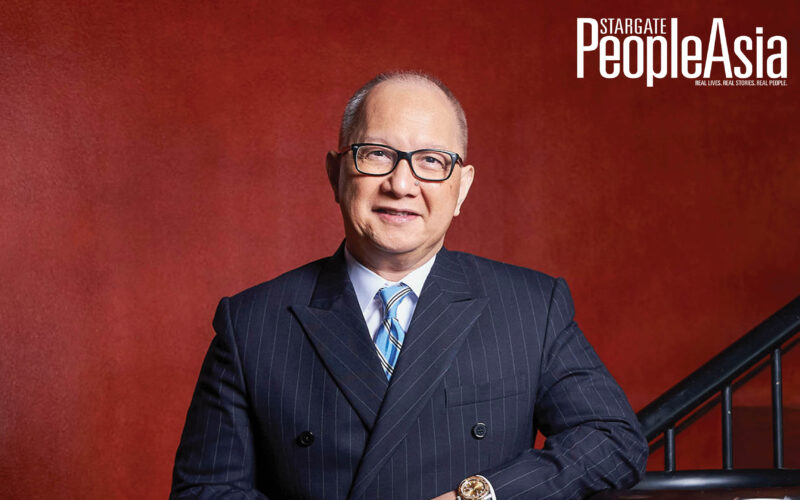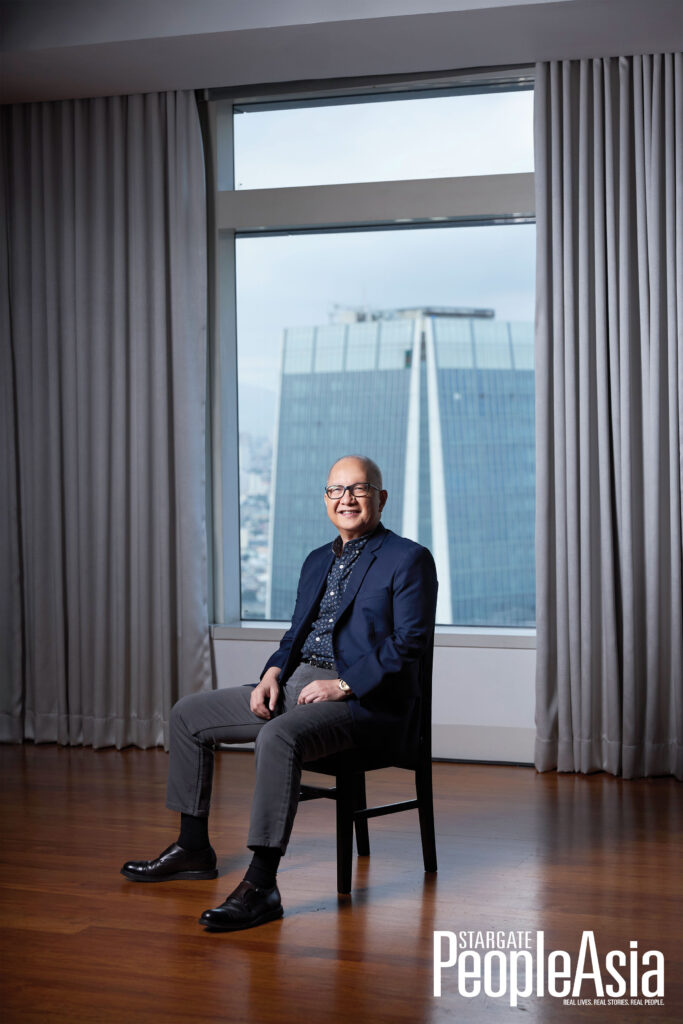BY JOYCE REYES-AGUILA
A trained physicist, the president and CEO of Rizal Commercial Banking Corp., altered the course of his career from science and the academe to the corporate world, specifically banking, after taking his MBA. Four years at the helm of RCBC, he has steered the bank to become, among others, the fastest-growing bank in the country, posting a 16-percent average annual growth.
As a young boy, he considered studying biology — with an aspiration to become a medical doctor. But it all changed for Eugene S. Acevedo when he discovered physics in high school, a subject he describes as “the most exact of sciences.”
He pursued the field in college and later landed a teaching job at the University of the Philippines-Diliman. From there, a scholarship offering — and, to be honest, national events — would alter the trajectory of his career. Soon enough, all roads eventually led to the field of banking and finance — culminating in his current role as president and chief executive officer of the Rizal Commercial Banking Corp. (RCBC).
Born in Cebu and raised in Surigao, he says his family put a premium on education and the advancement of the next generation. He later graduated magna cum laude from the University of San Carlos — with multiple academic and leadership awards.
“I always wanted to do three things (as a student). First, study what I was supposed to major in. Second, be very active in extra curriculars; I was student council chairman. Third, I was very curious about the world. A significant part of my time was spent reading up on various topics that were unrelated to my course,” he says.
In 1987, Acevedo received a scholarship from the Asian Institute of Management (AIM) where he graduated and ranked first in his Master in Business Management class. “It was a great opportunity,” he shares to PeopleAsia. His father’s career in the paper-making industry provided him with a model to emulate.
“Most of my father’s colleagues studied in Manila. Many of them had advanced degrees. I thought I had the opportunity to do the same. At around that time, AIM was being advertised as an accelerator of careers. That early, I was already thinking of coming to AIM, taking an MBA. I was hoping that I’d be able to accelerate my career that way.”
The physics lecturer thus decided to take up further studies. Some significant historical events in the Philippines during this period included the end of both martial law and the presidency of Ferdinand Marcos Sr. When President Corazon Aquino assumed office, her government was hobbled by an enormous external debt, a depleted economy and a real threat from insurgents.
“At that point, it was only banking that was hiring,” Eugene adds. “The other industry that was recruiting was agriculture. And since I was very active in extracurricular activities, the more I thought about it, the more I was convinced that my place was in the corporate world rather than in the sciences.”
The Believer
A major part of Eugene’s banking career was spent with Citigroup. A 23-year tenure saw him advance from being a management associate to becoming a managing director and head of global markets of the Hong Kong and Taiwan clusters and country treasurer in Hong Kong. As head of Citibank Hong Kong’s sales and trading business, he delivered three years of record revenues during the global financial crisis.
In Citibank, he developed derivatives products when he managed treasury sales in the Philippines for six years. “I did well in treasury and given my quantitative background, I was transferred to Hong Kong to join the Derivatives Marketing Asia team in 1994. This was where my physics background actually came in handy, because derivatives is a very quantitative job. As a result of that, my team started doing pioneering transactions.
“I was somehow always doing a task that was new. A derivatives transactor did not exist before I became one, after which I became the head of the derivatives desk, which was new as well. Then I was appointed regional directives sales head in Singapore at a time when we were growing the business significantly year after year. I think all those high growth and transformative positions that I occupied enabled me to move up the corporate ladder a bit faster than normal,” he says.
In 2010, Eugene was appointed president and CEO of the Philippine National Bank, where he led its rebranding and relaunch that resulted in 60 percent growth in profits and the tripling of its share price, moving market valuation from $300 million to $1 billion. He later joined UnionBank of the Philippines as senior executive vice president in 2011, becoming chairman of its thrift bank subsidiary, CitySavings, in 2013. Under Eugene and his team, CitySavings expanded its assets and income five-fold, becoming the top income generator for the bank.
Around 2019, Eugene met with RCBC chairperson Helen Yuchengco Dee. “I heard that there was an opportunity. Hence, I started reading up on the bank. So, by the time I met the chairperson, I already had ideas on how to to grow RCBC faster and reclaim its position among the bigger banks in the country.”
His vision is based on his belief “that RCBC and RCBC bankers were capable of doing much more than what they get credit for,” he shares of the 60-year-old bank. “I was a believer right from the start. And we have shown indeed that we could.”
Eugene was then appointed president and CEO of RCBC.
“In the last four years, we have been the fastest-growing bank in the industry, growing almost 16 percent on the average. Second, we have been the best digital bank for four years consecutive. Third, we were the first bank to declare our withdrawal of support for coal power plants and redirecting of our resources towards renewable energy. Fourth, a newspaper survey declared that we are the best bank in customer service, beating the bigger banks in the country. So, all those qualitative and financial achievements confirm what I have always believed in: that RCBC bankers can compete with rivals in the industry.”
On its official website, RCBC reported revenues totaling to P36 billion during the first nine months of 2023 and a seven percent improvement in core business profitability. Further, the bank’s assets climbed 12 percent and reached P1.2 trillion, driven by a 12 percent increase in customer loans. RCBC also posted 49 percent growth in its credit cards portfolio. The bank is currently the fifth-largest privately owned bank in the country, posting a 71-percent profit hike in 2022.

“What is important to note is that RCBC’s DNA is rooted in nation-building,” he continues. “This is why we put extra effort into supporting small and medium enterprises (SMEs), micro-entrepreneurs and the Filipino consumer. Our goal was to grow our SME and consumer book to half of the bank’s loan book. We are already there and we are in the process of doing more.”
RCBC also introduced a financial inclusion program in economic zones. “The main thrust of the program is to teach employees of ecozone companies financial planning or planning for the future,” Eugene explains. “I think we have to start with that because financial literacy is not yet taught in colleges and universities at this point.”
RCBC was recognized as the 2023 Grand Champion in Digital Payments and Financial Inclusion by the Bankers Institute of the Philippines. Its advocacy has registered 3.5 million users and distributed P6.5 billion of social amelioration payments during the COVID-19 pandemic, in partnership with the Department of Social Welfare and Development and Department of Labor and Employment, according to the executive’s bio.
Eugene adds that RCBC will continue to drive innovation in the financial sector. It recently introduced the RCBC Boz mobile app that Eugene says “was designed for micro-entrepreneurs or small businessmen (and) allows you to manage your payables, receivables and invoices — even do your payroll. Another product we just launched is the Payday Now. We were the first bank to do this. Payday Now allows employees of our payroll customers to obtain a cash advance against their salaries within two minutes by following just three simple steps.”
The bank additionally launched ATM Go, “a platform of now almost 4,000 mobile devices that act as a handheld ATM. You can find these machines in sari-sari stores and cooperative stores all over the archipelago. In fact, just a month ago, we delivered eight units of ATM Go to Tawi-Tawi, bringing formal banking to (the province). An ATM Go machine allows you to withdraw, deposit, do bills payment, apply for a loan plus many other things. It’s like having a bank in your barangay.”
Renewable energy is also on top of RCBC’s agenda, according to its leader. “Over the last 10 years, we’ve supported three gigawatts of renewable energy projects. And we continue to have a long pipeline of solar, wind and hydro projects proposed by our customers. We have become a specialist in renewable energy project finance.” RCBC’s website reports that the bank is one of the earliest adopters of Bangko Sentral ng Pilipinas’ Circular 1085, which mandates Philippine banks to integrate sustainability in their operations and strategies.
Overpreparation
RCBC takes good care of its people. Eugene says that at least 70 percent of new hires came from humble backgrounds, including breadwinners and those belonging to first generation graduates from their respective families.
Education is an integral part of Eugene’s life and mission, his main advocacy, which he views as society’s best equalizer. He also believes in redistributing opportunities equitably, scouring every corner of the country in search of the best, most qualified and most promising people.
Eugene himself has a remarkable educational background that includes attending the Advanced Management Program of the Harvard Business School, a certificate in Clean Power from the Imperial College London and completing executive programs in artificial intelligence and blockchain technologies from the Massachusetts Institute of Technology Sloan School of Management. He also studied at Johns Hopkins University to specialize in executive data science.
In any endeavor, Eugene says he relies on overpreparation. “This typically means learning as much as I can about the new challenges that I am going to be facing or the new product that I will be in charge of, or the new markets that I will be covering, because I have been assigned all over Asia. I have always studied markets, people, before I meet them.
“The other reason why I overprepare is that 6,200 RCBC bankers are dependent on our decisions,” he concludes. “We cannot base decisions on guesswork. I have to learn as much as I can, ask as many people as I can. Look at as much data as I can gather so the bank arrives at the best possible decision.”
Photography by Rap Yu
Grooming by Lars Cabanacan






